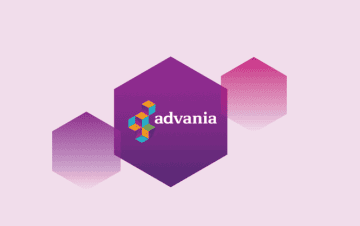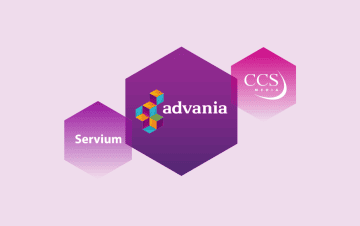This is the year where AI became mainstream. So much so that 72% of businesses are now using AI for at least one aspect of their business. With reliance on AI increasing, it’s more important than ever to ensure you are utilising it safely.
Microsoft released its own AI companion, Copilot, at the end of 2023. Copilot is designed to help speed up internal business processes by removing a number of mundane tasks from day-to-day routines. This also extends to AI-powered support within existing Microsoft productivity apps, allowing users to request AI-generated content in Word or bridge knowledge gaps with help conducting detailed analysis inside Excel. Tasks that would previously take hours to complete could now be actioned in seconds.
Servium and Advania have been at the forefront of the shift to AI since the get-go. Advania UK have helped many customers implement Copilot and have also been an early adopter themselves, deploying it to around 1100 UK employees so far. This has resulted in an increase in productivity and some happy accidents we didn’t foresee as a by-product of the technology.
Despite the benefits of AI, it has rightfully led to privacy concerns for many businesses. IT teams have acknowledged this issue, which has generated a growing interest in private AI from businesses of all sizes.
Why deploy a private AI?
Some companies have been hesitant to implement AI due to privacy and data confidentiality concerns. Businesses deal with sensitive information every day, so allowing this data to be assimilated into a model’s training data means it can inadvertently leak into public “consumer-grade” versions of the AI and become available to any other user using the model out in the wild.
Employees have also heard about the power of AI and are rightfully curious about its positive impact. It’s foolish to think your staff won’t have already experimented with public models to assist them in their duties. Businesses who have become accustomed to removing shadow IT from other parts of their operations may now need to take a critical eye in examining what AI is being used by their staff, who may not be considering the confidentiality implications.
Choosing to deploy a private AI allows you to utilise the power of mainstream AI tools like ChatGPT in a completely self-contained environment, and most importantly doesn’t compromise your data privacy. In real terms, this means you can secure your sensitive information whilst still benefiting from all the capabilities that a model has been trained on and “learns” in-situ, as well as providing supercharged insights from your own business data. Unlike public models, your data won’t be shared for training purposes which means that your information is no longer available for public consumption. This is particularly useful for organisations like hospitals who need to maintain patient confidentiality.
Do you need it?
While private AI is growing in popularity, it’s not a necessity. It’s important to review the needs of your company and weigh up the pros and cons before implementing this tool.
Configuring your own AI
A benefit of private AI is the ability to build your own environment. This ensures greater security and peace of mind knowing your data is inaccessible by anyone outside of your business. You can add data from inside your internal environment and grow your database without worrying this information will be processed or used externally.
Complying with the Law
Current public AI systems have raised data breach concerns due to the technology’s ability to collect and provide large amounts of data taken from the internet without permission. Private AI ensures compliance with global privacy regulations such as GDPR and CPRA by precluding data from being exposed via public AI.
Industries with strict data compliance rules, such as healthcare and finance, also benefit. These sectors are already looking at how to govern public AI usage through regulation that may impede the scope of how it can be used.
Training your own AI
Private AI allows you to pick and then train a LLM model on your own data and in many ways measures up more closely to what people perceive AI should be able to do for their business. Tools like Copilot (as great as it is) are more aligned to personal productivity rather than more meaty business process optimisation. With a private AI you can literally show it the types of tasks you want it to perform that are relevant to your business, and ask it to repeat, refine or improve – often creating a more reliable and valuable output. Examples include: document creation, writing emails, assisting with customer workflows, knowledge sharing and many more. Tailoring your AI model to your own business needs is appealing because it matches the capabilities of AI directly to business context and the point of impact.
Take control over performance and availability
Choosing private AI comes with a whole host of benefits, and not just those relating to the productivity of your teams. Designed and deployed correctly, there are some impressive commercial and operational gains to be realised too.
Take hold of your services
With private AI you can take back control of your AI services. With the technology deployed within your own environment, and in closer proximity to critical applications, you can reduce latency, boost performance and better empower your internal IT team to manage and support. This reduces your dependency on third-party providers which could otherwise leave gaps across your business.
Going incognito
Current public AI models have an option to go incognito to prevent AI from storing your data, but this often must be selected when setting up or accessing the tool. Private AI is designed to never run that risk. Your data will never be stored or accessed by third-party providers so you can rest assured knowing it’s not being used outside of your business.
Private AI also creates opportunities to use AI offline which is not currently possible with public models. This technology provides businesses with more autonomy over their data, more freedom to customise and align with their business and greater data compliance.
Savings, savings, savings
With any new technology, costs are always a concern. Public AI often runs on a per-use basis. If all employees can access public AI technology and utilise it as often as they like, the costs accrued quickly build up. What most companies haven’t realised is that private AI models could prove more cost efficient. By setting up your own AI and running an internal environment, you remove the per-user licensing costs and ultimately save money in the long-term.
Moving forward
At Servium, through the help of Advania, we are constantly extending our AI capabilities. Advania is a pioneer in AI, with expert experience in Microsoft and beyond. They have built and deployed a number of Private ChatGPT environments for specific business solutions and hold an extensive portfolio of kick start services to help qualify needs and transition into production models. They also offer managed services to support maintenance and ongoing feature development.
To learn more about private AI or to organise a demo speak to the Servium team today. Already a customer? Get in touch with your account manager to get started.
You may also be interested in
It’s official! CCS Media and Servium are now Advania
Advania have now officially completed the integration of CCS Media and Servium.
All you need to know as CCS Media and Servium become Advania
On 4th August 2025, CCS Media and Servium will become Advania. Work is underway to make the transition as smooth as possible, but there will be some important changes. Find out about what’s changing and what’s staying the same.
A new name for CCS Media & Servium is coming
This summer, Advania UK companies CCS Media and Servium will change their names to better reflect the unified business. Together, we will all be known as Advania.
 Paul Barlow
Paul Barlow





